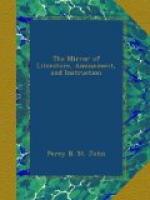The spot just at the entrance to the play-ground, at which Aram was taken into custody by two strange men from Yorkshire, is still remarked, and generally by the young scholar in a tremulous whisper.—Literary Gazette.
* * * * *
THE NATURALIST.
* * * * *
AGENCY OF MAN IN EXTINGUISHING OR SPREADING SPECIES.
Let us make some inquiries into the extent of the influence which the progress of society has exerted, during the last seven or eight centuries, in altering the distribution of our indigenous British animals. Dr. Fleming has prosecuted this inquiry with his usual zeal and ability, and in a memoir on the subject has enumerated the best authenticated examples of the decrease or extirpation of certain species during a period when our population has made the most rapid advances. We shall offer a brief outline of his results.
The stag, as well as the fallow-deer, and the roe, were formerly so abundant that, according to Lesley, from five hundred to a thousand were sometimes slain at a hunting-match; but the native races would already have been extinguished, had they not been carefully preserved in certain forests. The otter, the marten, and the polecat, were also in sufficient numbers to be pursued for the sake of their fur; but they have now been reduced within very narrow bounds. The wild cat and fox have also been sacrificed throughout the greater part of the country, for the security of the poultry-yard or the fold. Badgers have been expelled from nearly every district which at former periods they inhabited.
Besides these, which have been driven out from some haunts, and everywhere reduced in number, there are some which have been wholly extirpated; such as the ancient breed of indigenous horses, the wild boar and the wild oxen, of which last, however, a few remains are still preserved in the parks of some of our nobility. The beaver, which was eagerly sought after for its fur, had become scarce at the close of the ninth century, and, by the twelfth century, was only to be met with,




